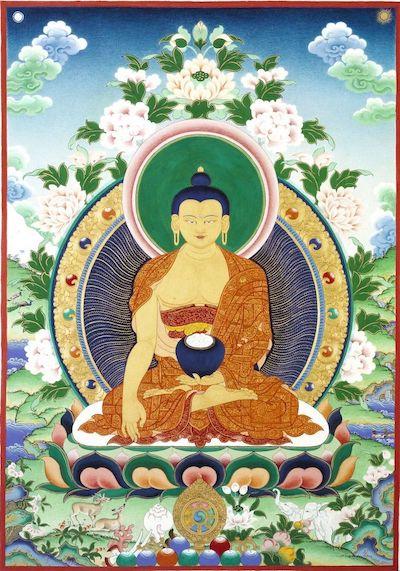Dear Friends,
Happy Chokhor Duchen, the Festival of Turning the Wheel of Dharma! Today, August 1, is the Buddhist holy day of Chokhor Duchen, the day on which Guru Shakyamuni Buddha gave his first teaching on the Four Noble Truths at Sarnath, India.
On these holy days, the power of any meritorious action is multiplied by 100 million, as taught in the vinaya text Treasure of Quotations and Logic. Please see Rinpoche's advice on practices that are most beneficial to do on multiplying days.
Chokhor Duchen is also the day on which FPMT celebrates International Sangha Day, a time when we rejoice in the merits and offer our support of FPMT ordained Sangha members. You can find out more about FPMT's community of monks and nuns here at the International Mahayana Institute (IMI). You can also learn more about what prayers and extensive offerings are being made to Sangha members on Chokhor Duchen here.
What's Coming Up: A New book & Web App
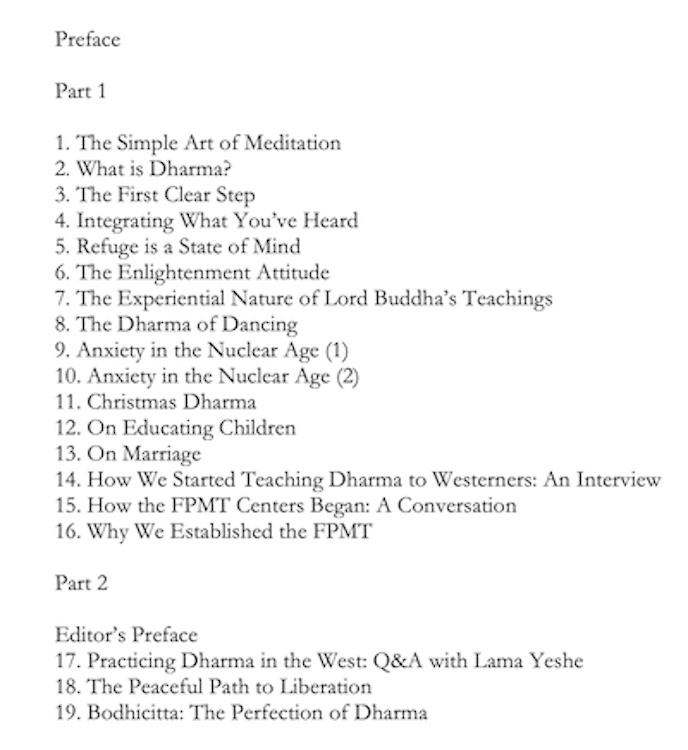 We hope to be sending our new Lama Yeshe book, Collected Talks, 1972–83: Volume 1, to our designer soon, expecting to publish it this fall. Here’s a sneak peek at the table of contents. Please contribute to the publication of this wonderful book on this special day here. Thank you so much.
We hope to be sending our new Lama Yeshe book, Collected Talks, 1972–83: Volume 1, to our designer soon, expecting to publish it this fall. Here’s a sneak peek at the table of contents. Please contribute to the publication of this wonderful book on this special day here. Thank you so much.
 We are putting the finishing touches on the forthcoming FREE web application based upon the very popular LYWA free book, Lamrim Year, which we published in 2021. The Lamrim Year web app will enable you to easily access your daily lamrim contemplation anywhere on a web browser, whether on your phone or on your computer. It will help you keep track of your progress through the lamrim outline, send you a reminder email when you complete each Day that includes a handy link to the next Day’s contemplation, give you the ability to review previous Days at will, allow you to take personal notes as you go, and provide easy access to all related Lamrim Year resources for more in-depth study. We expect to launch the Lamrim Year web app in the next few weeks.
We are putting the finishing touches on the forthcoming FREE web application based upon the very popular LYWA free book, Lamrim Year, which we published in 2021. The Lamrim Year web app will enable you to easily access your daily lamrim contemplation anywhere on a web browser, whether on your phone or on your computer. It will help you keep track of your progress through the lamrim outline, send you a reminder email when you complete each Day that includes a handy link to the next Day’s contemplation, give you the ability to review previous Days at will, allow you to take personal notes as you go, and provide easy access to all related Lamrim Year resources for more in-depth study. We expect to launch the Lamrim Year web app in the next few weeks.
FROM THE VIDEO ARCHIVE: The Wisdom That Knows Better
This month from the LYWA video archive, Lama Zopa Rinpoche explains how the false self tricks us but how our wisdom will not be fooled by this false appearance. This is an excerpt from teachings given by Lama Zopa Rinpoche during a retreat hosted by Thubten Kunga Ling Center in Boca Raton, Florida in November, 1998.
Visit and subscribe to the LYWA YouTube channel to view more videos freely available from our archive. See also the FPMT YouTube channel for many more videos of Lama Zopa Rinpoche’s teachings.
On the LYWA Podcast: The Compassionate Buddha Never Gives Up
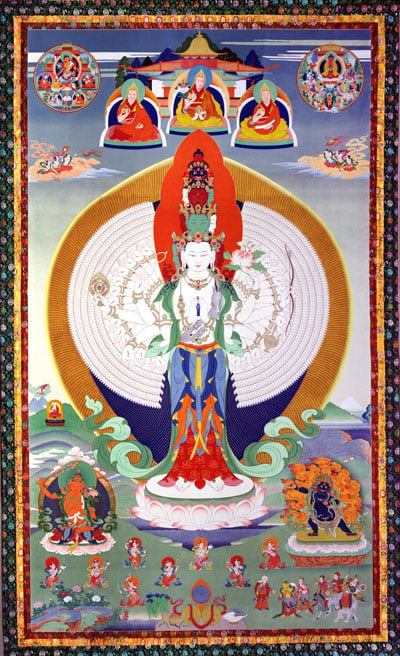 The Buddha of Compassion is the embodiment of all the buddhas’ great compassion that embraces and never lets go, never gives up on sentient beings even for one second. —Lama Zopa Rinpoche
The Buddha of Compassion is the embodiment of all the buddhas’ great compassion that embraces and never lets go, never gives up on sentient beings even for one second. —Lama Zopa Rinpoche
This month on the LYWA podcast, listen to Lama Zopa Rinpoche recite OM MANI PADME HUM and give teachings on the benefits of reciting the Compassion Buddha's mantra. Rinpoche also reassures us that no matter how low we may go, we can trust that the Buddha of Compassion will never give up on us. You can read along with the transcript on our website.
The LYWA podcast contains hundreds of hours of audio, each with links to the accompanying lightly edited transcripts. See the LYWA podcast page to search or browse the entire collection by topic or date, and for easy instructions on how to subscribe.
WHAT'S NEW ON OUR WEBSITE
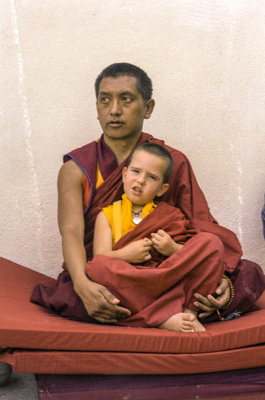
This month we have posted The Qualities of Lama Yeshe and Recognition of Lama Ösel, a teaching given by Lama Zopa Rinpoche at Kopan Monastery in March 1987. Rinpoche discusses the qualities of Lama Yeshe's holy body, speech and mind, the search for Lama's incarnation and the confirmation of Lama Ösel as the incarnation. Edited by Ven. Ailsa Cameron. Read more about the recognition of Lama Ösel and see rare photos of young Ösel in the Epilogue of Big Love: The Life and Teachings of Lama Yeshe.
We have a new Google Audio book to share with you, Teachings from Tibet. Our audiobook catalog includes free audiobooks from Google Play, as well as titles for purchase from Audible. As our collection of audiobooks continues to grow, we are pleased to announce a new way of locating audiobooks in our store. Simply go to “Refine Search” on our shop webpage and tick the Audiobooks category.
We are continuously improving the way our website functions, so you'll be happy to know that our Site Search has recently been enhanced. You can now refine your search by simply adding quote marks to a phrase. We’ve also improved and expanded the teaching tag search results.
We also have new additions to Lama Zopa Rinpoche's Online Advice Book this month to share with you:
- Crushed by Depression and Loss of Faith in Dharma: A student wrote that they had been practicing Dharma for over twenty years, but felt unable to continue, especially with the practice of guru devotion. Read Rinpoche’s compassionate response, along with an excerpt from the student’s letter.
- The Self-cherishing Thought Is the Real Enemy: Rinpoche sent this advice to someone who was in prison and had memorized The Wheel of Sharp Weapons text.
- Lamrim Is the Best Practice: A student had completed preliminaries and other practices, however, they had difficulties with effortful lamrim meditation. Rinpoche said there is nothing more important than lamrim practice and there is no way to go to enlightenment without it.
- Put the Blame on the Self-cherishing Thought: Rinpoche wrote this letter to a student who had written for advice about resolving conflict within the family. She said her family disliked Buddhism, they smoked and drank, and were unhappy that she was caring for many cats and dogs.
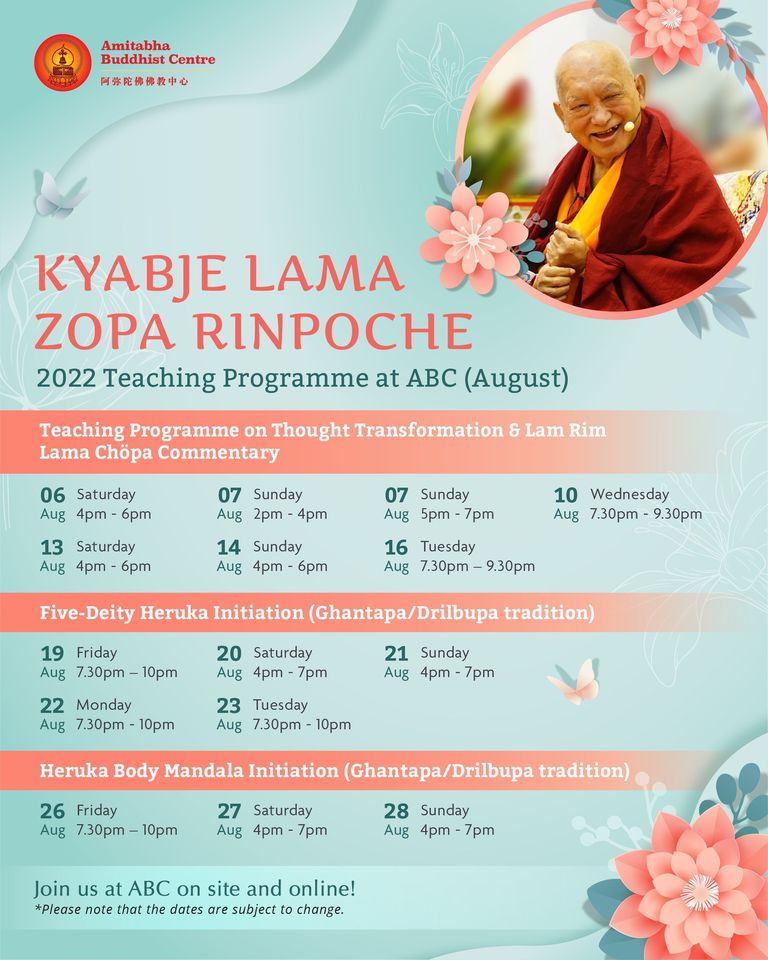 LAMA ZOPA RINPOCHE IN SINGAPORE
LAMA ZOPA RINPOCHE IN SINGAPORE
Earlier this month Rinpoche went to Singapore for minor surgery, from which he has fully recovered. Thanks to all who recited prayers and mantras for the complete success of this procedure. On Sunday, August 7, Rinpoche will teach on bodhicitta mindfulness for FPMT East & Southeast Asia’s regional course, “Exploring and Living in the Path.” Please see the FPMT SEA FB page or FPMT website for more information.
Rinpoche will also give teachings and initiations as shown, hosted by Amitabha Buddhist Centre (ABC), Singapore. Please see our multimedia presentation of Rinpoche’s previous teachings on Lama Chöpa (Guru Puja) as background to the upcoming ones.
Remember us on Chökhor Duchen
Big love,

Nick Ribush
Director
THIS MONTH'S TEACHING: REFUGE IN SANGHA
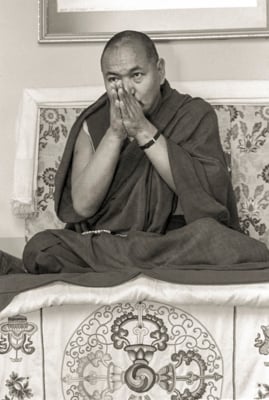 Q. Could you talk a bit more about refuge in the Sangha?
Q. Could you talk a bit more about refuge in the Sangha?
Lama. There are two levels of Sangha: relative Sangha and absolute Sangha. We are all relative Sangha. I am learning from you people, you are helping. If I have some understanding, if I am receptive, I learn from you people. You people also give me energy. Actually, we give each other energy. Let me make an example. I have the attitude that when I give my students the Vajrasattva initiation, they have to retreat for three months; do a strict retreat for three months. If they do a group retreat, they are almost always successful. But some people say, “Lama, I want to retreat by myself, alone; please let me.” I say, “All right, all right.” You know—what can I say? Baby cries, wants—what can I say? It is not my way to say, to insist, “You have to do it with the group.” Then they would freak out, wouldn’t they? Anyway, I know they would freak out, and instead of their experience becoming positive it would turn out negative. So I have to say, “Yes, yes, yes.” Then, with big eyes, I watch what they are going to do. The result is always disaster; they never finish a good retreat. They always break down and end up neurotic, saying, “Not possible, I get much lung,” and these things. It’s obvious, I understand.
But retreating with a group is always helpful. Let’s say today I’m down, a little bit depressed. My negative mind is questioning, “Ooh, why Vajrasattva? I don’t understand.” Actually, the negative mind doesn’t want to understand, so, “Why are we doing this? We are European people, all these Tibetan trips, Vajrasattva and yab and yum, all these things make me really crazy…instead of staying here meditating, I want to see my girlfriend/boyfriend.” Anyway, all these ridiculous kinds of minds come out. So then you tell your friend, “I have this happening, I don’t understand.” Then your friend, who may be a bit stronger, says, “Wait a minute, maybe you should think this way,” and tells you something positive. Actually, that person is really the one who brings you up and helps you get yourself together. So then you can control your negative mind a little bit. In other words, we learn from each other, kind of recycle each other, help each other. Really, human beings are so kind, incredible. From the time we were born up to now, sentient beings have been the source of life—our growth and everything. So you can understand the idea of the kindness of mother sentient beings; you can see.
So we are Sangha: you are my Sangha and I am your Sangha too. We are all Sangha for each other, we help each other. What is the reason, why do we need this? The need is simple. If you stay someplace where you are surrounded by people drinking wine all day, every day, intoxicated every night, with all kinds of activities going on, if you stay there maybe one year, they are giving you teachings every day: “Drinking wine is very nice, it brings your spirits up; whenever you are lonely, whenever you are depressed, drink some wine.” Then you’re like, “Maybe, yes, today I don’t feel so good, perhaps I’ll have a drink, check it out.” Then you feel, to some extent, for a short time, it helps. For a short time, you can ignore the problem; you become sort of unconscious.
However, I know, most of our students, when they go back to their own home, their old samsaric home, they become a complete disaster. One day they say, “Oh, last night I stayed up late talking with my friend; I can’t meditate this morning.” So they sleep in, and when they get up it’s already lunchtime, so it’s too late for meditation. Then the next evening, the same old story, “I have to go to a party.” Two days no meditation. That is the samsaric environment—not enough Sangha vibration. So, we are sick people who cannot stand by themselves. We need a cane or some other kind of help to stand. We are not yet liberated, so we do need the Sangha to help. We definitely need. For that reason, relative Sangha, we are all Sangha.
Now, absolute Sangha. We need a better Sangha, actually; Sangha who understand the inner, absolute quality of reality, non-duality. That is the real Sangha. We are relative Sangha, but we are not perfect Sangha. We can still help each other, but not in the most profound way, not until we discover nonduality. So, we desperately need the help of the absolute Sangha.
Also, you can see, you come here for a meditation course, you know it’s going to be difficult. Most of you students know it’s going to be difficult: “I’m sure my knees are going to hurt, especially listening to this monk pumping, pumping, pumping, pumping for two or three hours.” A situation in which you have never been before. And then sitting for six hours every day. “Six hours of sitting?”—you can’t even believe that yourself. “I can’t believe it.” I’m sure you could not believe it.
But it’s true, this is the human beauty, the beauty of the human quality. You could not believe it, I tell you. You cannot judge yourself, “I can do, I cannot do.” Human beings can do unbelievable things. Take Milarepa, for example—it seems to us that he was outrageous, doesn’t it? But if we want, we can do exactly what Milarepa did. You can never put any limits on human potential; it is so profound.
So you can see, here we put everybody’s energy together. I’m sure that the spiritual program coordinator sometimes makes you irritated—the SPC is Chenrezig Institute’s police, so sometimes he makes you irritated, telling you, “Please come to meditation, please come to puja. It’s not so nice if you don’t.” Then you’re like, “Why? Leave me alone. I want to be free from you. I don’t want your samsara.” Anyway, you understand.
The thing is that when we meditate, when it’s meditation time, we somehow make it sound a little bit exclusive. So I tell them to ask people who don’t come to please come, to use their wisdom and request sort of lightly, “Please come, these people need the help of your energy.” I believe that too—so everybody is together, giving energy to each other. You could not believe it. I mean, some young guy is sitting in front of you very sincerely; you’re an old man like me, feeling terrible, and your mind is going sort of, “Eerh,” so you learn from him: “I have to do better.” As soon as you have decided that you want to do better, you’re beginning to be better. But if you say at the outset, “I’m hopeless, I don’t care, I’m jealous of these people,” then you become worse.
So we do need Sangha, we do need the help of Sangha, I tell you. I think that most of our Western Dharma practitioners’ problem is that when they go back to their own samsaric nest there is no support; spiritually, no support. Everything is delusion, delusion, delusion. I mean, it is obvious. We take all that garbage into our minds, so then it becomes difficult for us.
Until you reach a certain level, you do need that help. If you discover the absolute truth, or the first bodhisattva bhumi, then you don’t need any support. Absolutely, you don’t need any external support. Then you can go anywhere—you can go to Sydney; you can go to Melbourne—you can liberate yourself. Also, many times students come to liberate people, but instead of their liberating other people, the other people liberate them—to samsara. So even I’m afraid that if I were to stay a long time in the West, perhaps Western people would liberate me into samsara! And they would give me the chocolate initiation!
From a teaching entitled “Refuge is a State of Mind” Lama Yeshe gave at Chenrezig Institute, 12 September 1979. A student asked Lama to talk more about refuge in Sangha. Excerpted from a book of Lama Yeshe’s collected talks, 1972–83, forthcoming from LYWA this fall. Compiled by Sandra Smith; Edited by Nicholas Ribush.
























